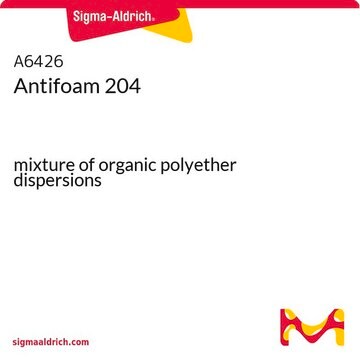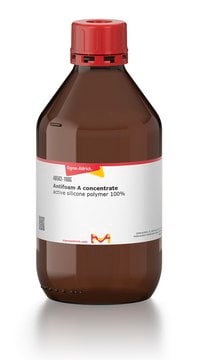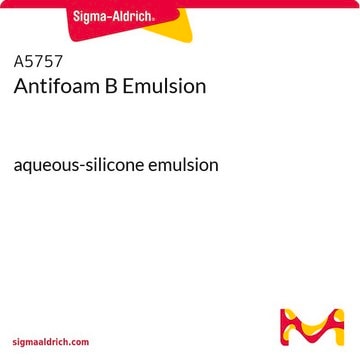A8311
Antiespumante 204
aqueous emulsion for bacterial and mammalian systems
Sinónimos:
organic antifoam
About This Item
Productos recomendados
Quality Level
form
emulsion (aqueous)
concentration
100% (organic)
density
1.01 g/mL at 25 °C
application(s)
microbiology
storage temp.
room temp
suitability
(Mammalian (suspension))
bacteria (fermentation)
¿Está buscando productos similares? Visita Guía de comparación de productos
Categorías relacionadas
General description
Application
Antifoam 204 has been used:
- in the expression and purification of PUL (PLAP, Ufd3p, and Lub1p) domain
- in fed-batch fermentation
- to prevent bubble formation due in aeration in Luria Bertani (LB) culture medium for bacterial growth
- in the batch fermentation with mineral medium
Components
Other Notes
Preparation Note
The optimal amount of antifoam required for various applications will need to be determined. Antifoam 204 is soluble in methanol, ethanol, toluene, xylene, perchloroethylene, and cold water at temperatures below 15 °C. It is insoluble in warm water and ethylene glycol.
related product
Storage Class
10 - Combustible liquids
wgk_germany
WGK 3
flash_point_f
Not applicable
flash_point_c
Not applicable
ppe
Eyeshields, Gloves
Elija entre una de las versiones más recientes:
Certificados de análisis (COA)
¿No ve la versión correcta?
Si necesita una versión concreta, puede buscar un certificado específico por el número de lote.
¿Ya tiene este producto?
Encuentre la documentación para los productos que ha comprado recientemente en la Biblioteca de documentos.
Los clientes también vieron
Nuestro equipo de científicos tiene experiencia en todas las áreas de investigación: Ciencias de la vida, Ciencia de los materiales, Síntesis química, Cromatografía, Analítica y muchas otras.
Póngase en contacto con el Servicio técnico










